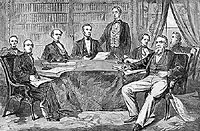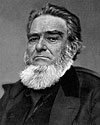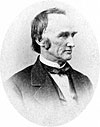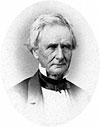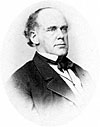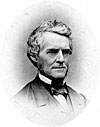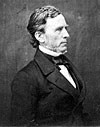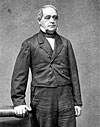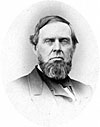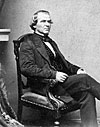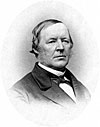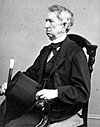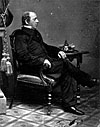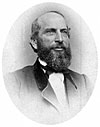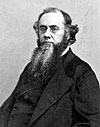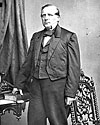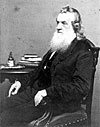President Lincoln’s cabinet included all of his major rivals for the Republican nomination for President in 1860—William H. Seward, Salmon P. Chase, Simon Cameron and Edward Bates. Some of these men had been effectively promised positions as part of the negotiations that led to Mr. Lincoln’s nomination at the Republican national convention in May 1860. Many of them objected to the inclusion of each other in the cabinet. There were worries about both geographic distribution and balance between former members of the Whig and Democratic Parties. There were also differences over ideology, ethics and personality. Simon Cameron came under particular attack because of his reputation for political and financial shenanigans.
“No President ever had a Cabinet of which the members were so independent, had so large individual followings, and were so inharmonious,” noted New York politician Chancey Depew.1 “One reason Lincoln appointed so many rivals to cabinet posts is that he intended to rely on his own judgment rather than that of his advisers,” noted historian William E. Gienapp. “Confident in his ability to decide on the correct policy, Lincoln never felt bound by the prevailing opinion in the cabinet, and he rarely revealed his thoughts until he had made up his mind.”A Although President-elect Lincoln had basically decided on his cabinet by the time he arrived in Washington in late February 1861, the appointments had not been formalized. Seward, for example, balked at accepting his nomination up to Inauguration Day.
Vice President Hannibal Hamlin played an important role in the cabinet selection process—but little role in the subsequent administration. In 1862, he wrote Jessie Frémont, who sought his help in getting a new army command for her husband, General John C. Frémont, “What can I do? The slow and unsatisfactory movements of the Government do not meet my approbation, and that is known, and of course I am not consulted at all, nor do I think there is much disposition in any quarter to regard any counsel I may give much if at all.”2
Hamlin was sacrificed in 1864 when President Lincoln and Republicans wanted to present a “Union” face to the electorate and added southern Democrat Andrew Johnson to the ticket. The greatest irony of Mr. Lincoln’s administration was that he grew closest to two men who were once his critics—Seward and Edwin Stanton, who replaced Cameron. Seward and Gideon Welles were the only two cabinet secretaries to remain in office throughout Lincoln’s service; both left office with President Andrew Johnson in 1869. All but Cameron, however, served until the reading of the draft Emancipation Proclamation in September 1862 and thus were immortalized in the famous Francis Carpenter painting of that event.
There was little social interaction between the Lincoln family and those of the cabinet secretaries — although President Lincoln sometimes visited their homes. Mrs. Lincoln distrusted and disliked several of them — particularly William H. Seward. She also disliked Edwin Stanton’s wife and Salmon Chase’s daughter Kate Chase Sprague. Among cabinet wives, she was close only with the wife of Gideon Welles. She had tried to indirectly influence cabinet appointments — working hard to block the appointment of Illinois lawyer Norman Judd.
Mr. Lincoln himself was misunderstood by his cabinet appointees, noted historian Helen Nicolay: “They were themselves so intent on living up to the requirements of their high station that they had become a bit self-conscious. Seeing him on a rare afternoon taking a holiday, greeted boisterously as a playmate by the grandchildren of old Mr. Blair, father of the Postmaster General, and racing with the children until the tails of his long broadcloth coat floated straight out behind, they were inclined to be critical. And when he playfully endorsed an official paper, ‘Submitted to Mars & Neptune,’ the heads of the War and Navy Departments could not reconcile such levity with their country’s good—or their own offended dignity.”3
President Lincoln’s conception of the Cabinet differed from that of many of his top appointees. Historian Gabor S. Boritt wrote: “Whig conservatism characterized Lincoln’s relations with his cabinet…His first outstanding biographer, J. G. Holland, noted perceptively as early as 1865: ‘His heads of departments were heads of departments indeed.’ When the President did decide to champion a cause brought forward by one of his advisors, he continued the practice of his more leisurely younger years and digested throughly the material at hand. Of course in this he had to be quite selective. A comparison of his Cabinet ministers’ annual reports with his own indicate that very few of their recommendations were even seconded.”A
Among the Cabinet members, there was also considerable friction, based on jealousy of relations with the President and animosity over policy. Nor did they generally get along very well. One important split was between Montgomery Blair, who generally did not get along with any cabinet colleagues, and Secretary Edwin M. Stanton, who was also very prickly. According to Gideon Welles, “The president took no part those rivalries and pretensions, nor in the difference between Stanton and Blair at a later period. In administering the government, however, he was necessarily brought into close official and personal intimacy with Mr. Stanton on all military question, yet he seldom failed to consult and relied greatly on the intelligence, experience, and judgment of Mr. Blair, who had received a military education, had been an army officer, and was more familiar with, and better understood the personnel of the service than the secretary of war or any of his colleagues. Mr. Stanton himself took much the same view as the president, and for a year or two deferred much to the opinions an judgment of Mr. Blair, who was almost daily at the war office, consulting and advising in regard to military operations. About the close of the year 1863, it was noticed that Mr. Stanton became reticent and uncommunicative towards the postmaster-general. This coolness grew so marked that Blair demanded an explanation. Stanton said he had been informed that Blair had made statements injurious to his character. Blair, understanding to what he alluded, replied that he had volunteered no statement, but when called upon by the president, on a certain occasion, he had communicated, in the frankness and confidence of cabinet consultation, as was his duty, certain facts which Stanton knew to be true. Without inquiring who had betrayed confidence, Blair said he had stated what Stanton knew to be a fact. This terminated all friendly intercourse. Neither ever after visited the other, or exchanged civilities. Whenever the president desired the views of either, he was compelled to get their opinions separately, or in general cabinet consultations. This political domestic controversy, which it was impossible to reconcile, had added to the other troubles of the president.”A
Much of the Cabinet jealousy was directed toward Secretary of State William H. Seward. Gideon Welles wrote: “Measures and important movements of each of the departments were generally, but not always, submitted to the Cabinet. The President was invariably consulted, but the Secretary of State stood in this respect like his colleagues, and his opinion and judgment, like theirs , was taken as were the others for what, in the estimation of Mr. Lincoln, they were wroth. The policy of the President and the course of administration were based on substantial principles and convictions to which he firmly adhered. Mr. Seward relied less on fixed principle than expedients, and trusted to dexterity and skill rather than the rightfulness of a cause to carry him through emergencies.”A
“Mr. Bates’s Diary is full of entries which show how closely the cabinet members were watching each other,” observed Helen Nicolay, daughter of presidential assistant John G. Nicolay. “He recorded a rumor, brought him by a great lover of gossip, that the Secretary of the Interior was in danger of being indicted for bribery. ‘One charge is that he took $400 from a person appointed to a 2d. class clerkship – salary $1400 per an[num]: I cannot believe this of Mr. Smith…’ At times he took a very dim view of the morals of the whole administration. On one such occasion he wrote:
Each one, statesman or General, is secretly working, either to advance his ambition, or to secure something to retire upon…
There is now no mutual confidence among the members of the Govt. – and really no such thing as a C.[abinet] C.[ouncil]. The more ambitious members, who seek to control – Seward – Chase – Stanton – never start their projects in C.[abinet] C.[ouncil] but try first to commit the Prest., and then, if possible, secure the apparent consent of the members. Often, the doubtful measure is put into operation before the majority of its know that is proposed.A
In his diary entry for December 31, 1861, Attorney General Edward Bates wrote: “In truth, it is not an administration but the separate and disjoined action of seven independent officers, each one ignorant of what his colleagues are doing.”4 In late November 1862, lincoln friend David Davis wrote: “The Cabinet are far from being a unit. Part of them really hate each other. Blair hates Chase and speaks openly on the street—and so it is with others. [Caleb B. Smith] says Lincoln don’t treat a Cabinet as other Presidents—that he decides the most important questions without consulting his cabinet.5 Three weeks later, relations came to a boil when a Senate delegation called on Mr. Lincoln on December 18, 1862, demanding changes in his Cabinet.
Mr. Lincoln finessed the situation by obtaining two letters of resignation but no resignations. Nevertheless, the process was painful and a New York Tribune reporter heard Mr. Lincoln say that “if there was any worse hell than he had been in for two days, he would like to know it.”6 In two cases—Simon Cameron in January 1861 and Salmon Chase in June 1864—cabinet secretaries were eased out of office. But President Lincoln bore no animus to either man and appointed them to other important government posts. In some cases, the President dealt frequently with sub-cabinet officials like Assistant Navy Secretary Gustavus Fox and Assistant Secretary of War Charles A. Dana. Dana later wrote:
“The relations between Mr. Lincoln and the members of his Cabinet were always friendly and sincere on his part. He treated every one of them with unvarying candor, respect, and kindness; but though several of them were men of extraordinary force and self-assertion—this was true especially of Mr. Seward, Mr. Chase, and Mr. Stanton—and though there was nothing of selfhood or domination in his manner toward them, it was always plain that he was the master and they the subordinates. They constantly had to yield to his will in questions where responsibility fell upon him. If he ever yielded to theirs, it was because they convinced him that the course they advised was judicious and appropriate. I fancied during the whole time of my intimate intercourse with him and with them that he was always prepared to receive the resignation of any one of them. At the same time I do not recollect a single occasion when any member of the Cabinet had got his mind ready to quit his post from any feeling of dissatisfaction with the policy or conduct of the President. Not that they were always satisfied with his actions; the members of the Cabinet, like human beings in general, were not pleased with everything. In their judgment much was imperfect in the administration; much, they felt, would have been done better if their views had been adopted and they individually had had charge of it. Not so with the President. He was calm, equable, uncomplaining. In the discussion of important questions, whatever he said showed the profoundest thought, even when he was joking. He seemed to see every side of every question. He never was impatient, he never was in a hurry, and he never tried to hurry anybody else. To every one he was pleasant and cordial. Yet they all felt it was his word that went at last; that every case was open until he gave his decision.7
Montgomery Blair got along with virtually no one else in the Cabinet. Historian William Ernest Smith wrote: “It was hard for Blair and Stanton to bear the presence of each other afer May, 1863. They neither spoke nor looked at each other in Cabinet meetings. Blair told Welles that he could not go to the War Department without being insulted. Stanton refused to grant reasonable requests of the Postmaster-General, even to facilitate the distribution of mail to the soldiers, if he thought it unnecessary. The President avoided interference in the disputes between them. Seward and Blair were friendly on the surface, but thoroughly distrusted each other. Seward feared that he would quarrel with Blair before the [1864]campaign ended, and tried to keep his peace, while at the same time retaining the support of Stanton, whom he did not want to support Chase.”8 Historian Allan Nevins noted that Blair “surrounded himself with feuds and antagonisms, which by 1864 had become dangerous in their intensity.” Blair even alienated those who might have been his natural allies, like “Attorney General Edward Bates, [whom] the Blairs had systematically undermined and opposed…in Missouri politics…”9 Bates in turn thought Montgomery and his family a bunch of “tricky politicians.”10 Relations within the Cabinet were worsened during the first four months of 1864 by a series of speeches which Montgomery’s brother Frank gave on the floor of the House of Representatives, charging Chase with corruption. One Massachusetts observer wrote his wife in early May 1864: “The cabinet is disjoined. There is more hate, more censure uttered by members of the cabinet against each other than I supposed possible.”11
Nevertheless, Maunsell B. Field, assistant secretary of the Treasury, spoke favorably of the relationships among cabinet members he witnessed between 1863 and 1865. “Mr. Chase spoke to me in extremely kind terms of the Secretary of State, saying that, since they had been associated together as members of Mr. Lincoln’s Cabinet, he had learned to esteem and respect him much more than he had done in former years in the Senate. I soon after had an occasion to repeat these remarks to Mr. Seward, to whom the recital seemed to afford much gratification. He referred, in turn, to Mr. Chase’s handsome conduct in resigning his seat in the Cabinet immediately after he had himself temporarily withdrawn from it under pressure from the Senate, and the embarrassment from which this considerate action of his colleague had relieved both the President and himself.”12
Problems continued. Presidential aide William O. Stoddard wrote in December 1863: “Washington has been more than usually well supplied with current talk and scandal of late. The expected change in the Department of the Interior has been a fruitful topic. The names most prominently mentioned in connection with the ‘succession,’ are those of Senator Browning, of Illinois, Judge Holt, and Judge Usher of Indiana, now Assistant Secretary of the Interior. Besides these, there are many others whose chances seem to be thought less of. For some reason or other, Secretary Smith has failed to make himself very popular, and his contemplated withdrawal occasions little or not stir. Other Cabinet changes are talked of by the wise ones, but no one appears able to ‘speak from the book.’”A
Part of the problem was a conflict of ambitions. William H. Seward had wanted to be President, and if he couldn’t be president, he wanted to act as if he was. Salmon P. Chase made it clear that he both wanted to be President and knew he would be a better one that Mr. Lincoln. Montgomery Blair wanted his brother Frank to be President and himself to be a Supreme Court Chief Justice. Attorney General Bates also wanted to head the Court and told the President so. After Chase departed the Cabinet, Chase and his friends shifted his attention to that post. Caleb Smith wanted to just be a member of the Court and maneuvered to block the appointment of Mr. Lincoln’s Illinois friends, David Davis and Orville H. Browning. Even Edwin Stanton aspired to lead the Supreme Court; his wife enlisted Browning’s aid in pressing his case in the fall of 1865. Gideon Welles alone seemed to have no conflicting aspirations—because he was better at critiquing the ambitions of others. Typical of Welles observations were the following two notes in his diary from April 1864.
April 22, Friday. [1864] Neither Seward nor Chase nor Stanton was at the Cabinet-meeting to-day. For some time Chase has been disinclined to be present and evidently for a purpose. When sometimes with him, he takes occasion to allude to the Administration as departmental,—as not having council, not acting in concert. There is much truth in it, and his example and conduct contribute to it. Seward is more responsible than any one, however, although he is generally present. Stanton does not care usually to come, for the President is much of his time at the War Department, and what is said or done is communicated by the President, who is fond of telling as well as of hearing what is new. Three or four times daily the President goes to the War Department and into the telegraph office to look over communications.”13
April 26, Tuesday. [1864] Neither Chase nor Blair were at the Cabinet to-day nor was Stanton. The course of these men is reprehensible, and yet the President, I am sorry to say, does not reprove but rather encourages it by bringing forward no important measure connected with either. As regards Chase, it is evident he presumes on his position and the condition of the finance to press a point, hoping it may favor his aspirations.
Stanton has a cabinet and is a power in his own Department. He deceives the President and Seward, makes confidants of certain leading men, and is content to have matters move on without being compelled to show his exact position. He is not on good terms with Blair, nor is Chase, which is partly attributable to that want of concert which frequent assemblages and mutual counselling on public measures would secure. At such a time the country should have the combined wisdom of all.14
Criticism of Postmaster General Montgomery Blair by Radical Republicans led to his forced resignation in the middle of the presidential campaign. With the reelection of President Lincoln in 1864, there were several resignations. Ward Hill Lamon remembered: “When Attorney-General Bates resigned, late in 1864, after the resignation of Postmaster-General Blair in that year, the Cabinet was left without a Southern member. A few days before the meeting of the Supreme Court, which then met in December, Mr. Lincoln sent for Titian F. Coffey, and said: ‘My Cabinet has shrunk up North, and I must find a Southern man. I suppose if the twelve Apostles were to be chosen nowadays, the shrieks of locality would have to be heeded.” By early in 1865, there were also new appointees to the Departments of the Interior and Treasury. Of the original cabinet only Secretary of State Seward and Navy Secretary Welles remained.
Footnotes
- Rufus Rockwell Wilson, editor, Intimate Memories of Lincoln, p. 503 (from Chauncey M. Depew, My Memories of Eighty Years).
- Allan Nevins, Frémont: Pathmarker of the West, p. 563.
- Helen Nicolay, “Lincoln’s Cabinet,” The Abraham Lincoln Quarterly, March 1949, Volume V, No. 5, p. 276.
- Howard K. Beale, editor, The Diary of Edward Bates, p. 220.
- Allan Nevins, The War for the Union, Volume II, p. 335.
- Don E. Fehrenbacher and Virginia Fehrenbacher, editors, Recollected Words of Abraham Lincoln, p. 496.
- Charles A. Dana, Recollections of the Civil War, p. 157-58.
- William Ernest Smith, The Francis Preston Blair Family in Politics, p. 247.
- Nevins, Frémont: Pathmarker for the West, p. 567.
- Howard K. Beale, editor, Diary of Edward Bates, p. 291.
- Allan Nevins, The War for the Union, Volume II, p. 71.
- Maunsell B. Field, Personal Recollections: Memories of Many Men and of Some Women, p. 262.
- Diary of Gideon Welles, Volume II, p. 16.
- Diary of Gideon Welles, Volume II, p. 17-18.
Visit
President Lincoln’s Cabinet
The Cabinet (Mr. Lincoln and Friends)
Abraham Lincoln and the Radical Republicans

